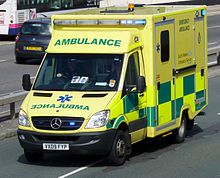|
Emergency medical services (abbreviated to the initialism EMS in some countries) are a type of emergency service dedicated to providing out-of-hospital acute medical care and/or transport to definitive care, to patients with illnesses and injuries which the patient, or the medical practitioner, believes constitutes a medical emergency. The use of the term emergency medical services may refer solely to the pre-hospital element of the care, or be part of an integrated system of care, including the main care provider, such as a hospital. Emergency medical services may also be locally known as: first aid squad, emergency squad, rescue squad, ambulance squad, ambulance service, ambulance corps or life squad. The goal of most emergency medical services is to either provide treatment to those in need of urgent medical care, with the goal of satisfactorily treating the presenting conditions, or arranging for timely removal of the patient to the next point of definitive care. This is most likely an emergency department at a hospital or another place where physicians are available. The term emergency medical service evolved to reflect a change from a simple system of ambulances providing only transportation, to a system in which actual medical care is given on scene and during transport. In some developing regions, the term is not used, or may be used inaccurately, since the service in question does not provide treatment to the patients, but only the provision of transport to the point of care. In most places in the world, the EMS is summoned by members of the public (or other emergency services, businesses or authority) via an emergency telephone number which puts them in contact with a control facility, which will then dispatch a suitable resource to deal with the situation. In some parts of the world, the emergency medical service also encompasses the role of moving patients from one medical facility to an alternative one; usually to facilitate the provision of a higher level or more specialised field of care. In such services, the EMS is not summoned by members of the public but by clinical professionals (e.g. physicians or nurses) in the referring facility. Specialized hospitals that provide higher levels of care may include services such as neonatal intensive care (NICU), pediatric intensive care (PICU), state regional burn centres, specialized care for spinal injury and/or neurosurgery, regional stroke centers, specialized cardiac care (cardiac catherization), and specialized/regional trauma care. In some jurisdictions, EMS units may handle technical rescue operations such as extrication, water rescue, and search and rescue. Training and qualification levels for members and employees of emergency medical services vary widely throughout the world. In some systems, members may be present who are qualified only to drive the ambulance, with no medical training. In contrast, most systems have personnel who retain at least basic first aid certifications, such as Basic Life Support (BLS). Additionally many EMS systems are staffed with Advanced Life Support (ALS) personnel, including paramedics, nurses, or, less commonly, physicians. 
A paramedic of the New South Wales Ambulance Service travelling by motorcycle
From Wikipedia, the free encyclopedia : Other paramedical practices (no physiotherapy and psychology) and alternative healers |




